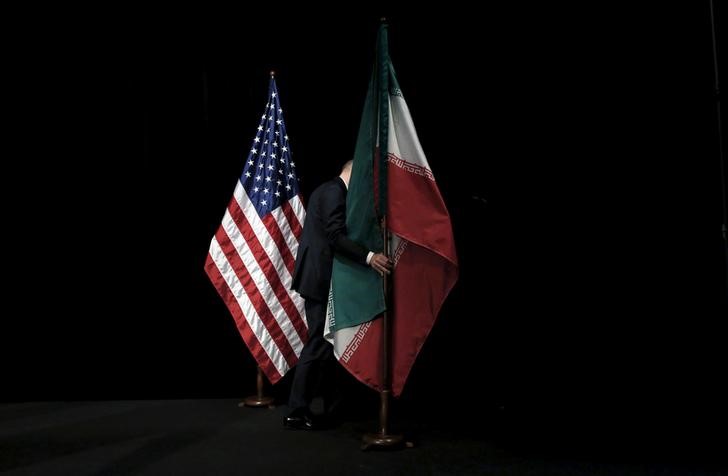
FILE PHOTO – A staff member removes the Iranian flag from the stage after a group picture with foreign ministers and representatives of the U.S., Iran, China, Russia, Britain, Germany, France and the European Union during the Iran nuclear talks at the Vienna International Center in Vienna, Austria July 14, 2015. REUTERS/Carlos Barria/File Photo
October 12, 2017
BERLIN (Reuters) – U.S. President Donald Trump’s expected move to “de-certify” the international nuclear deal with Iran is driving a wedge between Europe and the United States and bringing Europeans closer to Russia and China, Germany said on Thursday.
German Foreign Minister Sigmar Gabriel has spoken out repeatedly against Trump’s likely step, but his latest comments aimed to spell out the impact it would have in starker terms.
“It’s imperative that Europe sticks together on this issue,” Gabriel, a Social Democrat, told the RND German newspaper group. “We also have to tell the Americans that their behavior on the Iran issue will drive us Europeans into a common position with Russia and China against the USA.”
Trump is seen unveiling a broad strategy on confronting Iran this week, likely on Friday, including a move to de-certify Iran’s compliance with the 2015 accord, which he has called an “embarrassment” and the “worst deal ever negotiated.”
Senior U.S. officials, European allies and prominent U.S. lawmakers have told Trump that refusing to certify the deal would leave the U.S. isolated, concede the diplomatic high ground to Tehran, and ultimately risk the unraveling of the agreement.
The U.N. nuclear watchdog has repeatedly certified that Iran is adhering to restrictions on its nuclear energy program mandated by the deal to help ensure it cannot be put to developing atomic bombs.
Signed by the United States, Britain, France, Germany, Russia, China, the European Union and Iran, the deal lifted sanctions on Tehran in exchange for curbs on its nuclear work.
Germany has close economic and business ties with Russia, although relations have soured since Moscow’s annexation of Ukraine’s Crimea region. Berlin is also working to expand ties with China.
Gabriel is expected to leave his post in coming months since his Social Democrats have vowed to go into opposition after slumping badly in the Sept. 24 election, opting not to reprise an awkward “grand coalition” with Merkel’s conservatives.
Gabriel on Monday urged the White House not to jeopardize the nuclear agreement, saying such a move would worsen instability in the Middle East and could make it more difficult to halt nuclear arms programs in other countries.
In the interview released on Thursday, he said the nuclear agreement was being treated “like a football” in U.S. domestic politics, but the issue could have serious consequences.
He said Russia was watching developments closely, including the divisions between Europe and the United States. “That doesn’t exactly strengthen our position in Europe.”
Ultimately, Gabriel told the newspaper group, there were only three countries – the United States, Russia and China – that could avert a new nuclear arms race.
“But those countries mistrust each other so much at the moment that they are not working together sufficiently. It must be in our interest to press for more trust.”
(Reporting by Andrea Shalal)
